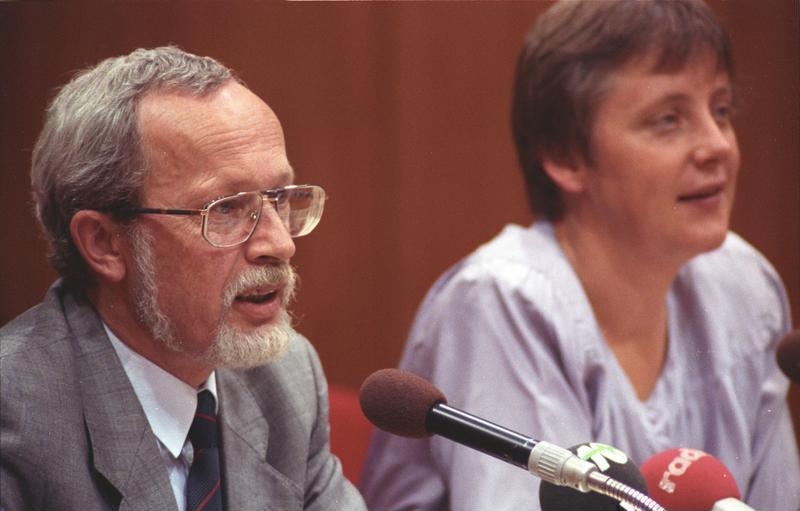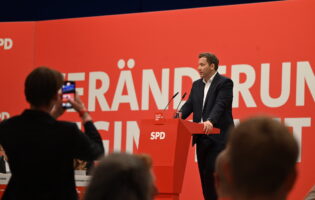
Bundesarchiv via Wikimedia Commons
AGI Asks: What is Angela Merkel’s Impact on United Germany?

Christiane Lemke
Leibniz University Hannover
Christiane Lemke is Emerita Professor of Political Science and International Relations and former Director of the Jean Monnet European Center of Excellence at Leibniz University Hannover, Germany. She is also Adjunct Professor in the Political Science Department at UNC Chapel Hill. Her principal fields of interest are norm construction and change in international relations, with a particular focus on the European Union and transatlantic relations. She has held positions at Harvard University, New York University and Stanford University Berlin. She was also the first woman in Germany to serve as the director of the state parliament in Lower Saxony. Christiane Lemke is a member of the Alumni Board at Leibniz University Hannover, board member of the German Studies Association, and she is on the editorial board of German Politics and Society.

David Patton
Connecticut College
David Patton is Joanne Toor Cummings '50 Professor of Government and International Relations at Connecticut College, where he teaches classes on comparative politics, contemporary Europe, the European Union, nationalism and ethnic conflict, German politics, Green parties, and the Cold War.
In his research, he focuses on German party politics, political regionalism, and German foreign policy. In Out of the East: From PDS to Left Party in Unified Germany (Albany, NY: SUNY Press, 2011), Patton chronicles how the Party of Democratic Socialism (PDS), as successor to the discredited Communist party of East Germany, first became a successful regional party and then an increasingly influential national force. In Cold War Politics in Postwar Germany (New York: St. Martin's Press, 1999), he explores the relationship between the Cold War and "chancellor democracy" in the Federal Republic of Germany.
Patton’s publications include “The Alternative for Germany’s radicalization in historical-comparative perspective,” Journal of Contemporary Central and Eastern Europe 25:2 (2017). In “Monday, Monday: Eastern German Protest Movements and German Party Politics since 1989,” German Politics 26:4 (2017), he explores the conditions under which eastern social movements recast political parties in the Federal Republic. He sheds light on past U.S.-German relations in “Navigating Choppy Waters: US-German Relations during the Last Decade of the Cold War,” which was published in Reagan and the World: Leadership and National Security, 1981–1989, Bradley Lynn Coleman and Kyle Longley, eds. (Lexington: University Press of Kentucky, 2017).
As a U.S. Fulbright Scholar, Patton conducted research and taught at Europa-University Viadrina in Frankfurt (Oder), Germany in spring/summer 2014. He was a fellow at the Berlin Program for Advanced German and European Studies and received a research grant from the Friedrich Ebert Foundation. In addition, he has been a visiting scholar at the Minda de Gunzburg Center for European Studies at Harvard University and a visiting researcher at the Berlin Social Science Center.

Helga A. Welsh
Wake Forest University
Helga A. Welsh is Professor of Politics and International Affairs at Wake Forest University. Her publications have focused on the history and politics of the former East Germany, German unification, transitional justice, the reform of higher education in Germany, and democratization processes in Central and Eastern Europe. She has published a book on denazification in the former East Germany and co-edited a book on German unification. Her most recent book (co-authored with Christiane Lemke) is Germany Today. German Politics and Policies in a Changing World (Rowman and Littlefield, 2018). Her articles have appeared in journals such as Comparative Politics, European Journal of Education, Europe-Asia Studies, German Politics, German Politics and Society, and West European Politics. She is one of the editors of “German History in Documents and Images,” a project administered by the German Historical Institute in Washington, DC. She served as co-editor of German Politics from 2014-2018.

Hope M. Harrison
The George Washington University
Hope M. Harrison is Professor of History and International Affairs at The George Washington University. She is the author of 2 books about the Berlin Wall: After the Berlin Wall: Memory and the Making of the New Germany, 1989 to the Present (Cambridge University Press, 2019) and Driving the Soviet up the Wall: Soviet-East German Relations, 1953-1961 (Princeton University Press, 2003).

Jonathan Olsen
Texas Woman's University
Jonathan Olsen is Professor and Chair of the Department of History and Political Science at Texas Woman's University. He is the author of four books and has written widely on a variety of political parties in Germany, including the Linke, in such journals as German Politics and Society and German Politics.

Konrad Jarausch
University of North Carolina
Konrad Jarausch is Lurcy Professor of European Civilization at the University of North Carolina, Chapel Hill.
AGI Asks: What is Chancellor Merkel’s legacy for united Germany?
Hope M. Harrison
The George Washington University
Just as many American Blacks did not feel President Barack Obama advanced their cause as much as they had hoped, so many eastern Germans likely feel the same way about Chancellor Angela Merkel, who grew up in East Germany. Indeed, in many ways, eastern Germans feel the country is more divided in 2021 than it was when Merkel took office in 2005. Her openness to refugees from Syria, Iraq, and elsewhere in 2015 resulted in the pivoting of the Alternative for Germany party (AfD) into a far-right, anti-immigrant party that gained a stronghold in the east. Putting itself forward as the voice of the downtrodden east, the AfD garnered roughly one-quarter of the votes in parts of the east in the 2017 and 2021 federal elections and in three eastern state elections in 2019.
Although much has improved in the east with regard to income levels, life expectancy, pollution, and infrastructure, significant parts of the population feel left behind and invisible to policymakers. Wages are on average 17 percent lower in the east; no major German companies have their headquarters in the east; and the German political, cultural, media, and financial elite are predominantly from the west. In recent years, Merkel and others have admitted they underestimated the challenges felt by those in the east since unification and that more must be done to promote east-west dialogue and an inner sense of unity.
Konrad Jarausch
University of North Carolina
One of chancellor Angela Merkel’s most important contributions to German unity is symbolized by her outsider biography. Her East German background as the daughter of a Protestant clergyman and a trained physicist made her quite sensitive to the frustrations of former GDR citizens with the halting progress of unification. The peaceful revolution drew her into politics as press spokesperson of Lothar de Maizière, gave her cabinet posts under Helmut Kohl, and made her head of the Christian Democratic Union. Even as chancellor she kept in touch with her electoral district of the Pomeranian Island of Rügen through frequent visits, talks with her constituency, and advocacy for improvements like the Ozeanium aquarium. She also invited foreign leaders to the Brandenburg castle of Meseberg in order to show off the achievements of post-communist transformation. But since she was careful to appear as chancellor of all Germans, she did not act like a regional advocate, much to the disappointment of some Easterners. In her final speech at German Unity Day in 2021, she formulated as the lesson of thirty-one years of unification: “Be prepared for new encounters, be curious about others, tell your own histories and tolerate differences.”
Christiane Lemke
Leibniz University Hannover and UNC Chapel Hill
Approaching Angela Merkel’s legacy from the perspective of international politics, her most lasting impact might be in her support of rules-based international order. As the first female chancellor of Germany, Merkel was initially perceived as a “transitional” leader, but she not only proved to be a resilient politician domestically; she also swiftly learned the rules of the game in foreign affairs. In Europe and elsewhere the reunification of Germany raised some fears of a new German “hegemon,” but Merkel’s commitment to multilateralism and her management of several crises in Europe have told another story. She successfully helped to avert a deep crisis of European integration after the failure to ratify the European Constitutional Treaty in 2007, and—while highly controversial—she was instrumental in holding the Eurozone together during the financial crisis of 2010-13. Of all the EU crises she managed, the migration crisis of 2015 stands out, when she invited about one million migrants stranded on the Balkan route to Germany. Based on humanitarian arguments, this decision followed her conviction that a rules-based international order required politicians to “do the right thing.” Her most lasting legacy, therefore, may be in the realm of responding to global challenges.
Jonathan Olsen
Texas Woman’s University
Angela Merkel’s contribution to German unity is ambiguous. On the one hand, as the first (and so far only) chancellor from the east, her symbolic stature is unquestionable, as is her role in advocating policies that have closed some of the economic, political, and social gaps between the east and west. On the other hand, considerable differences—from wages and wealth to social and political attitudes—have stubbornly persisted between the two halves of Germany. As she herself noted in a recent speech marking the 31st anniversary of German unification, “mentally and structurally, unification hasn’t been completed yet.” The failure to more fully grow together during Merkel’s time as chancellor is evident in the last two federal elections. To be sure, all parties in the German political system are well represented in the east as well as the west; there are, strictly speaking, no eastern regional parties as once was the case with the ex-communist Party of Democratic Socialism (PDS), now Left Party (Linke). And yet the right-wing populist Alternative for Germany (AfD)—borne from a radical rejection of Merkel (who is considerably less popular in the east than in the west) and the CDU—has now come to dominate large swaths of the east. The interests, sentiments, and resentments it represents, although not solely eastern, are nevertheless decidedly more pronounced there than in western Germany. In short, the “wall in the head” still exists. It will be up to Merkel’s successors to tear it down completely.
David Patton
Connecticut College
In the thirty-one years since unification, Angela Merkel has served as federal chancellor for sixteen of them. Although Helmut Kohl is feted as the unity chancellor, can Merkel, the first chancellor from the former GDR, also lay some claim to this title? Chancellor Merkel showed skeptical westerners and uncertain easterners that a politician from the east can capably lead the Federal Republic. In a recent address, Merkel related in highly personal terms how her past in the GDR has been described as “ballast.” The Chancellor took issue with the view that she and other east Germans are not original Federal Republic Germans and Europeans but rather have had to learn to be so. Her words surely resonated among fellow easterners. As a former GDR citizen, Merkel was in a position to understand challenges faced by eastern Germans, to convey them to westerners in a non-threatening way, and in so doing advance national unity.
As chancellor, Angela Merkel presided over a narrowing of the gap between easterners and westerners in regard to per capita income, pension levels, and especially unemployment rates. Yet these gaps stubbornly persist and were not a top federal priority during the Merkel era. As leader of the overwhelmingly western CDU, Merkel refrained from casting herself as the voice or advocate of the east. She initially opposed the national minimum wage, a reform that increased pay for many easterners. Only after massive pressure from her coalition partner, the FDP, did Merkel back the candidacy of the east German Joachim Gauck as federal president in 2012. Even though her party did not receive an “eastern bonus” when Angela Merkel first ran, the CDU increased its vote share in the region from around 25 percent in 2005—twelve percentage points below the CDU/CSU’s western share—to just under 30 percent in 2009. By 2013, its eastern vote share stood at 38.5 percent, close to its western tally of 42.2 percent. This pointed to Merkel’s role as a unifying figure. Yet as Chancellor Merkel leaves office, few eastern politicians in the CDU appear set to assume national prominence.
Although Chancellor Merkel remains popular among German voters, she unleashed a storm of protest, especially strong in the east, when she welcomed refugees to the Federal Republic in late summer 2015. The Alternative for Germany (AfD) tapped into this discontent to establish itself as a major competitor to the CDU in the new Länder. In the 2017 federal election campaign, Merkel faced enraged protesters in eastern Germany and her party’s vote share in the region dipped below 28 percent. In the 2019 European Parliament elections, the CDU fell below 22 percent in eastern Germany. That year, leading Christian Democrats in the east thought it best not to have the Chancellor attend campaign events for eastern regional elections. In 2021, the CDU led by Armin Laschet won around seventeen percent of the eastern vote, well below what the CDU/CSU received in the former West Germany. The current crisis of the CDU in the new Länder and the AfD’s rise are elements of the Merkel legacy that threaten to hinder greater east-west unity in the coming years.
Helga A. Welsh
Wake Forest University
Chancellor Angela Merkel will soon retire after sixteen years in office. She will be remembered for many achievements, including winning the highest office in the Federal Republic as a woman who grew up in communist East Germany. Both women and eastern Germans remain underrepresented at the highest echelons of power. Many speculated that her “exotic” background would affect her policy style and, at times, policies, but she went to great lengths to preempt imputations based on her gender, upbringing, and early career in East Germany: she was chancellor of all Germans.
In an uncharacteristically personal speech on the 31st anniversary of German unity on October 3, 2021, she called out western German writers who viewed her eastern socialization as a “burden” and labeled her a “learned” German and European. Many eastern Germans can identify with the suffered slights and condescension these remarks reveal, although many have been her fiercest critics. Merkel’s popularity and policies transcend East-West differences and point to a complex balance sheet that blends achievements with setbacks. The process character of German unification persists while inner unity remains a construct open to interpretation. History will acknowledge her eastern German background—a subtle but not defining factor of her chancellorship.









